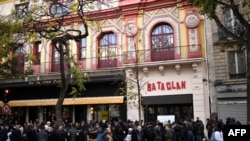The trial of the accused Bataclan massacre perpetrators has been a trial like no others, not only for its exceptional length of 10 months, but also for the time it devoted to allowing victims to testify in detail about their ordeal and their struggles in overcoming it, while families of those killed spoke of how hard it was to move on.
"We became this huge community which wanted justice to exist, and that was very strong," said Arthur Denouveaux, a survivor of the Bataclan attack, in which 90 died, and the president of Life for Paris, a victims' association.
Salah Abdeslam, the main suspect, who faces possible life imprisonment without parole, a sentence only handed out four times in France so far, started the trial by proudly saying he was a "soldier" of Islamic State, which has claimed responsibility for the attacks.
But he later apologized to the victims.
"When Salah Abdeslam decided to speak to apologize, I don't know if it was genuine or not but still he felt he had to do the effort, so that counts," Denouveaux said.
Abdeslam is the only surviving member of the group suspected of carrying out the attacks. But he says he chose not to detonate his explosive vest and on Monday urged the court not to give him a harsh sentence.
"I made mistakes, it's true, but I'm not a murderer, I'm not a killer", he said.
Thirteen other people, 10 of whom are also in custody, were also in the courtroom, accused of crimes ranging from helping provide the attackers with weapons or cars to planning to take part in the attack. Six more were tried in absentia.
"I think we can be proud of what we achieved," Denouveaux said. "The trial overcame anything we would have wished for, because terrorists spoke, terrorists in a way answered to our testimonies, that was so unexpected, that never happens in terrorist trials."





